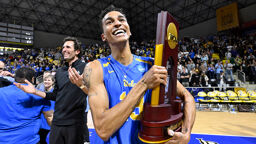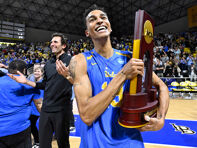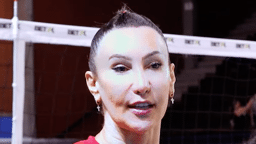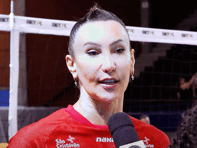In some ways, Miguel Lozano wasn’t quite prepared for the reaction he would receive when he started living life as a boy. A student in the Los Angeles area, he needed to live his life authentically, even if it meant facing a period of personal struggle. He had some close friends and family who would have his back no matter what, but he feared the reaction of others.
As he emerged as Miguel in his personal life, some of those fears were realized.
"It was very difficult,” Lozano told Outsports over the phone in his quiet, yet not quite shy, voice. “I was discovering myself and people were seeing me as me. People around me treated me differently, including my family and friends and teachers."
To be sure, Lozano found support amongst some people. Yet the sudden shift in how people looked at him and treated him ate at the young man.
It was some of his friends who stuck around who encouraged him to try out for the boys volleyball team at Huntington Park High School, just south of Downtown Los Angeles. He had a passing interest in the sport, and he felt that he would not get the full high school experience without playing some sport along the way.
He wanted “athlete” to be part of his identity.
He had played a sport previously, but he had been placed on the girls team. That didn’t sit well with Lozano, as it wouldn’t with any other boy. He wanted to join a boys team, and he was set on trying out for volleyball.
“This sport is more than just a sport, it's a bonding experience.”
When he approached the head coach of the boys volleyball team, Mary Velis, she knew it was coming. She had seen him in the hallway of school and had even engaged the administration with questions about Lozano’s eligibility to play on a boys team. They assured Velis that he had the right to try out for the boys team, and that there was nothing stopping her from giving him a roster spot. When Lozano asked Velis about trying out, everyone was on the same page.
"When he asked me about trying out for volleyball, we knew he would be on the boys team,” Velis told Outsports. “No questions asked."
Velis had been trained in the “win or die” military culture. She has been in the Army for nine years, deployed to Iraq for both Operation Iraqi Freedom and Operation New Dawn.
As she left the daily life of the military (she is still in the Army Reserve) and entered coaching, she found an organization, Up2Us Sports, that softened the win-or-die approach: She learned how to be a coach and a teacher of young people. Up2Us Sports provides coaches and team leaders with, among other resources, a toolkit called “Creating A Safe Space,” which was created in conjunction with the Ben Cohen StandUp Foundation. That tool kit includes best practices for working with transgender athletes.
"It's really important to have more of a bond and a relationship with my students,” Velis said. “Up2Us has made me more of a bonding coach, building culture within the team, including informal time as part of the process."

That culture, built on the foundation of interpersonal relationships, created an environment that didn’t have to adjust to a trans athlete. It was already ready for him.
"He knew when he came to practice that he was safe and he could talk to me about anything he has going on."
Lozano said the other boys on the team have never teased him. Having that space, where he could be himself, express himself and play on the court with his teammates and friends as himself, meant more to him than he realized it would.
"As soon as I walk into the gym I feel comfortable, and that I’m not going to be harassed,” Lozano said. “I don't feel like people are going to watch me."
Lozano admits he wasn’t in a good place sophomore year when he first entertained the idea of playing volleyball. Losing friends, having family express trouble with his gender identity… it all beat Lozano into a quiet shell of a young man. Being part of the boys volleyball team has given him the self-worth, friendships and support structure to bust out of that shell.
"He was intimidated at first, and he was super shy,” Velis said, describing Lozano’s personality today as “bubbly,” a dramatic shift in two years. “Now he knows he has a safe space, and I can see it, even away from the team, he seems a lot happier than where he was his sophomore year."
"As soon as I walk into the gym I feel comfortable, and that I’m not going to be harassed.”
As Lozano enters his senior year in high school, he is likely going to skip the volleyball season. With the strength and determination he’s learned from his sport, along with his new support structure, he is considering a physical transition that would require months of recovery from surgery.
As we talked on the phone for about a half hour, it was during our conversation about his physical transition that his voice suddenly lit up with a deeper excitement.
"Of course,” he said of his sudden jolt of energy. “It's a life-changing event."
While his continued transition will mean his high school volleyball career is over, he will never forget the life lessons he learned from Velis and his teammates
"When you’re a student athlete you have to be a student first,” Lozano said. “That means I have to be responsible and get things done before and after practice. This sport is more than just a sport, it's a bonding experience."







































